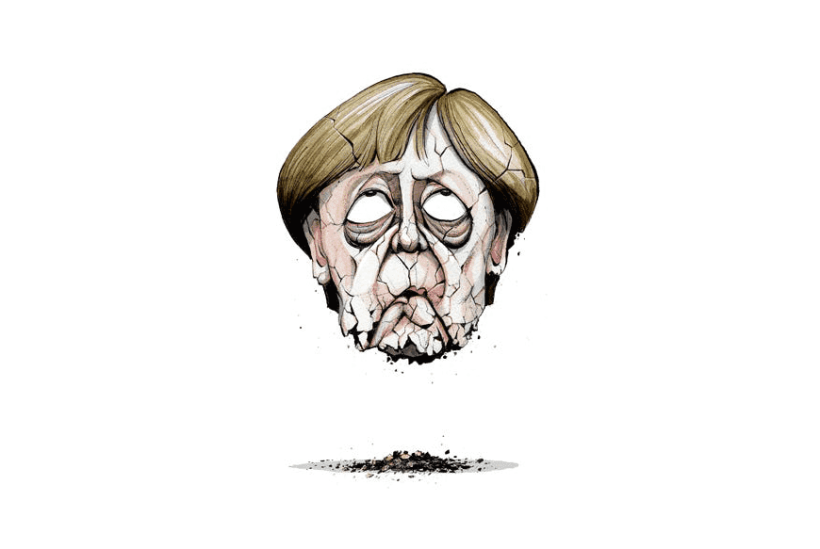It is hard to keep count of the German orthodoxies that have died a long overdue death on the battlefields of eastern Ukraine.
Annäherung durch Handel, the claim that government lobbying for German industry in Moscow and Beijing would moderate those capitals by tying them to our trade interests. That didn’t work.
Building a gas pipeline from St Petersburg based on a mission to make up for historic war crimes, even after the Russian army had annexed 10,000 square miles of a neighbouring country? It turns out that pacifist gestures are only taken seriously at one end of the pipeline.
Refusing to send weapons to a war zone over fears that you might end up escalating the conflict? Well, brutal autocrats don’t need much encouragement if they plan on flattening a city.
Less than a year after Merkel retired while still with sky high polling figures, the world that the woman known as Mutti (mummy) built for her voters has collapsed under its own contradictions. Germans now have a very different view of the woman who never lost a national election.
One would think that the fact that Merkel’s legacy is now so tainted would be music to the ears of the far-right Alternative for Germany (AfD) and the far-left Linke party. For both, Merkel was public enemy number one. To the far-left, she was a puppet of American vulture capitalists. To the far-right, she was a Social Democrat in disguise who was driving Germany into economic ruin.
The AfD in particular nurtured a cult of hatred of the former Chancellor in the east of Germany, where they stoked fears that she saw herself as a Mother Teresa figure whose job it was to house the world’s poor.
During the refugee crisis, whenever Merkel appeared in public in the east, an angry mob would be waiting to jeer and whistle her every word. The AfD certainly weren’t scared of suggesting drastic solutions. Refugees approaching the border should be shot if necessary, one senior party member insisted.
But one of the deepest ironies of the ‘new era’ in German politics that was ushered in by Russia’s invasion of Ukraine is that the fringe parties that owe their success to hating Angela Merkel have now become the last defenders of her legacy.
‘Chancellor Scholz must finally have the courage to stand up for de-escalation and a peaceful solution to the war. He needs to put his bellicose Foreign Minister on a leash,’ AfD leader Tino Chrupalla demanded recently, referring to Annalena Baerbock of the Greens who has said arms supplies ‘save lives’.
‘Germany needs to set a good example and be the first to lift all the economic sanctions against Russia, which above all harm its own citizens,’ another leader of this new party of doves said.
And it’s not only Merkel’s Russia policies that the far right are keen to defend. With Berlin rumoured to be planning restrictions on investment in China, Chrupalla has said that the government ‘shouldn’t end free trade for ideological reasons’.
‘We must cultivate free trade with all states,’ stated Chrupalla, the leader of a party who took to the streets to protest against the planned TTIP free trade deal with the US in 2015.
On the opposite side of this upside down world, the left-wing Linke party have decided that it is their responsibility to stand up for German industry.
Germany must immediately end ‘the economic war it started’ against Russia, senior party member Sahra Wagenknecht said in the Bundestag last week, where she excoriated the government for not immediately opening the Nord Stream 2 pipeline to keep German industry afloat through the winter.
Former Linke leader Gregor Gysi has even suggested that Merkel should be sent to Moscow to negotiate a ceasefire.
Merkel herself has remained almost completely silent since the war broke out, limiting her public statements to a perfunctory condemnation of Russian aggression and an insistence that she acted in the best interests of the country at the time.
One wonders whether she still understands a world in which the AfD are her staunchest allies.
Got something to add? Join the discussion and comment below.
Get 10 issues for just $10
Subscribe to The Spectator Australia today for the next 10 magazine issues, plus full online access, for just $10.



















Comments
Don't miss out
Join the conversation with other Spectator Australia readers. Subscribe to leave a comment.
SUBSCRIBEAlready a subscriber? Log in